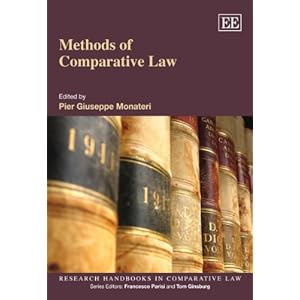Readers should look out for Pier
Giuseppe Monateri (ed), Methods of comparative law (2012):
 Comprising
an array of distinguished contributors, this pioneering volume of original
contributions explores theoretical and empirical issues in comparative law. The
innovative, interpretive approach found here combines explorative scholarship
and research with thoughtful, qualitative critiques of the field. The book
promotes a deeper appreciation of classical theories and offers new ways to
re-orient the study of legal transplants and transnational codes.
Comprising
an array of distinguished contributors, this pioneering volume of original
contributions explores theoretical and empirical issues in comparative law. The
innovative, interpretive approach found here combines explorative scholarship
and research with thoughtful, qualitative critiques of the field. The book
promotes a deeper appreciation of classical theories and offers new ways to
re-orient the study of legal transplants and transnational codes.
Methods of Comparative Law brings to bear new thinking on topics including: the
mutual relationship between space and law; the plot that structures legal
narratives, identities and judicial interpretations; a strategic approach to
legal decision making; and the inner potentialities of the ‘comparative law and
economics’ approach to the field. Together, the contributors reassess the
scientific understanding of comparative methodologies in the field of law in
order to provide both critical insights into the traditional literature and an
original overview of the most recent and purposive trends.
A welcome addition to the lively field of comparative law, Methods of
Comparative Law will appeal to students and scholars of law, comparative law
and economics. Judges and practitioners will also find much of interest here.
It contents
include:
PART I: WHY “METHODS”? AN INTELLECTUAL PROJECT ON THE MULTILAYER STRUCTURE OF
LEGAL COMPARATIVISM
1. Methods in
Comparative Law: An Intellectual Overview
P.G. Monateri
2. Intent on Making Mischief: Seven Ways of Using Comparative Law
M. Andenas and D. Fairgrieve
3. Method?
S. Glanert
4. ‘Comparison as Deep Appreciation’
G. Watt
PART II: REVISITING CLASSICAL THEORIES AND PERSPECTIVES ON COMPARATIVE LEGAL METHODOLOGIES: HOW TO STEER A CRITICAL GLANCE
P.G. Monateri
2. Intent on Making Mischief: Seven Ways of Using Comparative Law
M. Andenas and D. Fairgrieve
3. Method?
S. Glanert
4. ‘Comparison as Deep Appreciation’
G. Watt
PART II: REVISITING CLASSICAL THEORIES AND PERSPECTIVES ON COMPARATIVE LEGAL METHODOLOGIES: HOW TO STEER A CRITICAL GLANCE
5. The
Functional Method
J. Gordley
6. How to Do Projects with Comparative Law. Notes of an Expedition to the Common Core
G. Frankenberg
7. Descriptive and Purposive Categories of Comparative Law
S. McEvoy
PART III: LEGAL TRANSPLANTS AND TRANSNATIONAL CODES: QUESTIONING ON CULTURAL BIASES AND SCIENTIFIC STATEMENTS
J. Gordley
6. How to Do Projects with Comparative Law. Notes of an Expedition to the Common Core
G. Frankenberg
7. Descriptive and Purposive Categories of Comparative Law
S. McEvoy
PART III: LEGAL TRANSPLANTS AND TRANSNATIONAL CODES: QUESTIONING ON CULTURAL BIASES AND SCIENTIFIC STATEMENTS
8. All that
Heaven Allows: Are Transnational Codes a ‘Scientific Truth’ or Are They Just a
Form of Elegant ‘Pastiche’?
G. Samuel
9. Contextualizing Legal Transplant: China and Hong Kong
L. Chen Kong
PART IV: SPACE, BOUNDARIES AND JURISDICTIONS: THE COREOGRAPHIC SPECTRALITY OF LAW
G. Samuel
9. Contextualizing Legal Transplant: China and Hong Kong
L. Chen Kong
PART IV: SPACE, BOUNDARIES AND JURISDICTIONS: THE COREOGRAPHIC SPECTRALITY OF LAW
10.
Interstitium and Non-law
P. Goodrich
11. The Iconicity of Space: Comparative Law and the Geopolitics of Jurisdictions
C. Costantini
PART V: LEGAL NARRATIVES, JUDICIAL INTERPRETATIONS AND SUBVERSIVE PARADIGMS
P. Goodrich
11. The Iconicity of Space: Comparative Law and the Geopolitics of Jurisdictions
C. Costantini
PART V: LEGAL NARRATIVES, JUDICIAL INTERPRETATIONS AND SUBVERSIVE PARADIGMS
12. The
Resilience of History: Comparative Legal Theory and the End of the American
Century
A.L. Marasco
13. Ludex Translator: The Reign of Finitude
J. Gaakeer
14. Further Terrains for Subversive Comparison: The Field of Global Governance and the Public/private Divide
H. Muir Watt
PART VI: POLITICAL ECONOMIES AND THE INNER POLICIES OF LAW: TOWARD A 'COMPARATIVE LAW AND ECONOMICS' ASSESSMENT
A.L. Marasco
13. Ludex Translator: The Reign of Finitude
J. Gaakeer
14. Further Terrains for Subversive Comparison: The Field of Global Governance and the Public/private Divide
H. Muir Watt
PART VI: POLITICAL ECONOMIES AND THE INNER POLICIES OF LAW: TOWARD A 'COMPARATIVE LAW AND ECONOMICS' ASSESSMENT
15. Toward the
Economics of Comparative Law: The ‘Doing Business’ Debate
A. Nicita and S. Benedettini
16. Quantitative Methods in Comparative Law
F. Parisi and B. Luppi
A. Nicita and S. Benedettini
16. Quantitative Methods in Comparative Law
F. Parisi and B. Luppi

No comments:
Post a Comment